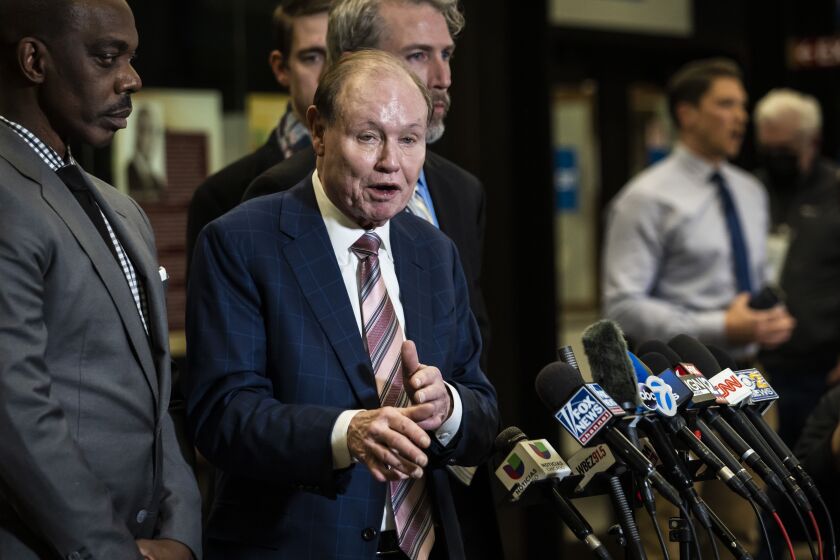The jury in Jussie Smollett’s trial felt they were doing him “a favor” when they convicted the former “Empire” actor on five counts of disorderly conduct, but not a sixth, one of the jurors told the Sun-Times Friday.
The decision was one the jury struggled with, the juror said.
In the end, “we all thought we were doing Jussie a favor,” said the juror, who asked not to be named.
That count charged the actor with lying to police during a second interview with detectives on Feb. 14 when he reported he was the victim of an aggravated battery. The other five counts of disorderly conduct Smollett was convicted of were for reporting a battery and for reporting a hate crime to other officers in the hours after the attack.
Essentially, the jurors got hung up on the reasoning behind the last charge and why it was charged differently than the others.
“We were told it was an aggravated battery because he said they were wearing a mask,” the juror said. But “in all [of Smollett’s] accounts of what happened, he mentioned a mask.”
If prosecutors had charged all the battery counts the same, “I think we probably would have found him guilty” on all six, she said.
In the end, it took the panel of six women and six men nine hours to decide Smollett’s fate. Not all were convinced special prosecutors had proven their case beyond a reasonable doubt when they first began deliberations Wednesday night, the juror said.
“It was not evenly split, but there were some doubters,” she said.
It wasn’t that the doubting jurors believed Smollett was innocent, she added, just that they wanted to spend more time reviewing the evidence and talking it over.
“I just hope that [Smollett and his attorneys] know that we went in there with an open mind,” the juror said. “I listened to both sides. We wanted to make sure that those who had doubts didn’t feel pressured.”
Lengthy discussions to weigh the evidence and testimony during the trial accounted for how long the deliberations took, more than disagreement between jurors, she said.
The jury felt there were too many instances in the case that Smollett didn’t have credible answers for when he took the stand, the juror said.
In addition, she said, the jurors weren’t presented with any witnesses that backed Smollett’s side.
“We all wanted to hear from Frank,” the juror said, referring to Smollett’s creative director, Frank Gatson.
Gatson is the person who initially called police — allegedly against Smollett’s wishes — and the juror said the group felt he would have been able to provide critical details that might have given Smollett’s testimony more weight.
Gatson was included on the defense’s list of potential witnesses but was never called.
Ultimately, though, the juror said, they found the testimonies of brothers Abimbola and Olabinjo Osundairo more credible than Smollett — though she added neither brother was thought to have been completely forthcoming by the jury.
Their testimony, however, was backed up by police, she noted. That was in contrast to Smollett’s defense, the juror said, which consisted mostly of “character witnesses” who couldn’t testify to the facts of the case.
Lead defense attorney Nenye Uche in particular, she said, seemed to be “just shooting from the hip.”
That the defense had accused the brothers of seeking a $2 million payout from the actor to change their story didn’t sit well with the juror when they presented no evidence or testimony to back up that claim.
That’s compared to Special Prosecutor Dan Webb’s “methodical, plodding” style, she said. The veteran prosecutor was particularly convincing in his closing arguments and made the state’s case appear “seamless.”
Following the verdict, Uche criticized the jury’s split decision, saying, “The verdict is inconsistent. You cannot say Jussie is not lying for the same exact incident.”
But Richard Kling, a professor at the Chicago-Kent College of Law who followed the trial, praised the jury for its careful consideration of each of the counts.
“I think that’s a wonderful reflection on the jury,” he said.
He disagreed with Uche’s assessment.
“Juries are [at times] inconsistent,” Kling added. “This was not inconsistent. On five counts they found he was responsible, and the other one they were unsure” so they declined to convict.
Overall, the decision was a heavy one for the jury to bear; the juror noted the panel didn’t know what sentence Smollett would face.
“It wasn’t an easy decision. You’ve got the mother sitting there. You feel bad. We didn’t know what the penalty would be. Are we sending this guy to jail?” she said.
The juror said she hopes Smollett will get probation, which seems likely given his lack of criminal background.
Contributing: Tom Schuba






